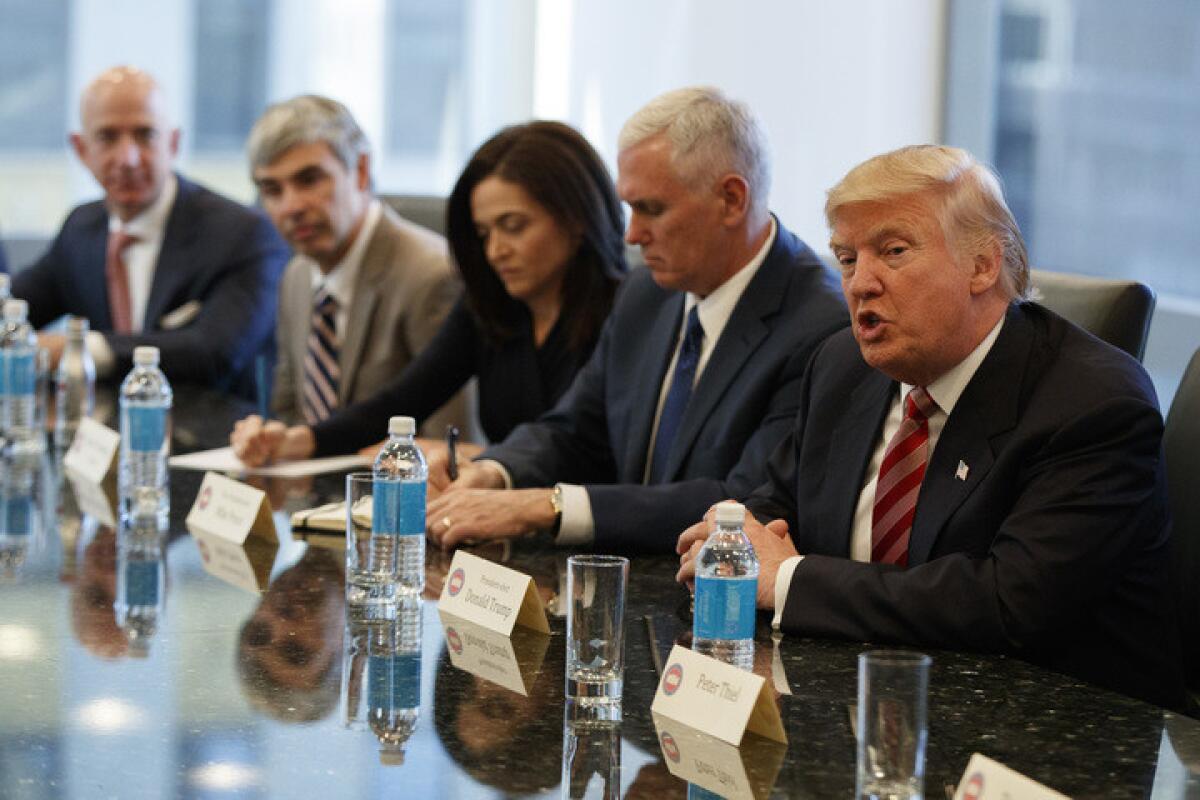Tech workers pledge to never build a database of Muslims

President-elect Donald Trump and and Vice President-elect Mike Pence met Wednesday with technology industry leaders, including, from left, Amazon founder Jeff Bezos, Alphabet Chief Executive Larry Page and Facebook Chief Operating Officer Sheryl Sandberg.
Reporting from San Francisco — When asked a year ago on the campaign trail whether he thought that the United States should create a database of Muslims in the country, Donald Trump said in an interview with NBC News: “Oh, I would certainly implement that — absolutely.”
On Tuesday, hundreds of members of the technology industry weighed in on whether they would help build such a database. The answer? Absolutely not.
By Wednesday afternoon more than 640 software engineers, designers, business executives and data processing personnel from U.S. firms such as Google, Twitter, Microsoft, Mozilla and Palantir Technologies had signed a pledge “choosing to stand in solidarity with Muslim Americans, immigrants, and all people whose lives and livelihoods are threatened by the incoming administration’s proposed data collection policies.”
As part of the pledge, the individuals promised, among other things, to:
- Refuse to participate in the creation of databases that would allow the government to target individuals based on race, religion or national origin
- Advocate within their organizations to minimize data collection that would facilitate ethnic or religious targeting
- Responsibly destroy high-risk data sets and backups
- Resign from their organization if ordered to build such a database
With the signing of the pledge — reportedly a grass-roots initiative led by engineers at Wave and Slack — the tech industry is drawing battle lines, said Kresta Daly, a civil rights and criminal defense attorney based in Sacramento.
When employers see that their workers are openly unwilling to cooperate, “it makes it difficult for a process like that to move forward,” she said.
It’s unclear whether the incoming government will lean on the tech sector to build such databases, or if it will even make good on its promise to bar Muslims from entering the country.
In the weeks following Trump’s victory, the president-elect’s team backtracked on his earlier statements, saying that he had never advocated for “any registry or system that tracks individuals based on their religion.” However, Trump’s website is still calling for a “total and complete shutdown of Muslims entering the United States” — a proposal that, if implemented, could rely on such a database.
The U.S. government has been known to pressure the technology industry for help — whether it was asking Microsoft to help the National Security Agency circumvent encryption on Outlook.com Web chats or the FBI demanding that Apple help unlock the iPhone of one of the shooters in the San Bernardino terrorist attack (Microsoft complied; Apple refused).
Daly believes that building any such database would need the help of popular social networks, which collect troves of user data. Those signing the pledge hope to hedge against that.
Whether such a pledge will have material effect on the creation of a Muslim database is still unknown, though. The signatories represent only a tiny fraction of the number of people who work for big tech firms (Google alone has nearly 60,000 employees), and most tech executives have stayed mum on the topic.
The only high-profile tech firm to have spoken out against working with the government to surveil its users is Twitter, with its general manager of data and solutions writing on Nov. 22: “We prohibit developers… from allowing law enforcement — or any other entity — to use Twitter data for surveillance purposes. Period.”
Facebook, which initially declined to comment, issued a statement Wednesday saying it had not been asked to build a Muslim registry, “and of course we would not do so.”
Twitter won kudos from civil rights activists for being the first to speak up on its position, but its outright refusal to work on a Muslim database may have cost the company some standing with the Trump administration. Trump invited tech executives such as Facebook’s Sheryl Sandberg, Alphabet’s Larry Page, Tesla’s Elon Musk and Microsoft’s Satya Nadella to join him on Wednesday in New York for a technology summit, but Twitter Chief Executive Jack Dorsey was absent, despite the president-elect being an avid user of the platform.
Politico attributes the snub to Twitter’s refusal to allow the Trump campaign to disseminate a #CrookedHillary emoji. Republican National Committee communications director Sean Spicer told MSNBC said Twitter’s omission was because “the conference table was only so big.” In his conversation with tech leaders, Trump suggested that PayPal co-founder and transition team advisor Peter Thiel helped cull the list of invitees by rejecting firms that were “too small.”
Pledge signatories are hoping that the noise they’re now making will make keep their company leaders from agreeing to create such a database if the Trump administration requests one.
“I believe the indirect effects of this pledge may be even more powerful than the direct effects,” Valerie Aurora, a programmer who signed the pledge, said in a blog post on her website. “In my experience, tech company executives will pay close attention to any cause powerful enough to get tech workers to pledge solidarity with each other and with the most vulnerable in society.”
Twitter: @traceylien
melissa.etehad@latimes.com
ALSO
Fed inches up key interest rate for first time in a year, projects three more hikes in 2017
I own an Amazon Echo and an Echo Dot, and I still don’t know what they’re good for
UPDATES:
3:50 p.m. This article was updated with additional details. It was originally published at 1:10 p.m.





